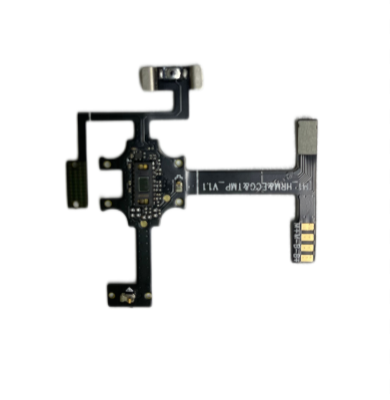A major trend in medical devices and wearables is miniaturization, where gadgets need to be as small as possible while still reliably performing their assigned functions. Flexible circuits solve various challenges faced by manufacturers of flexible CIRCUIT boards. One of the remarkable features of flexible circuit boards is that it allows flexible circuit board manufacturers to make smaller devices. Let's take a look at some of the main reasons flexible circuit boards are used in medical devices and wearables.
The dynamic bending
Flexible circuit boards have extraordinary bending or bending abilities. Medical devices usually expand/contract during their operation. The bending properties of FPC boards make them ideal for medical applications. This property is also beneficial for applications connected by a hinged device. Flexibility is particularly challenging for designers in the healthcare industry, as it has not been a major consideration in medical electronics in the past. Most early medical devices used to be larger and more robust. With the advent of flexible circuits, medical devices are evolving to be more compact, durable and flexible.

reliability
Reliability is the ability of a system to continuously perform its required functions without causing performance degradation or failure. Reliability is becoming critical in medical applications and wearables. In general, interconnect points are potential sources of electronic failure. Flexible circuits minimize connection points and simplify assembly. This property of flexible circuits eliminates the opportunity for defects such as poor solder joints for interconnection. Flexible circuit boards are basically made of polyimide materials. These polyimide flexible circuit board materials are resistant to a variety of environmental and chemical changes. The ductility and flexibility of flexible circuit board materials minimize the impact of shock and vibration events.
Electrical reliability
Flexible circuit board materials are essentially ideal for high-speed signal applications. The flexible circuit board provides electrical reliability with the following features: improved dielectric constant compared to standard rigid materials; Uniform material thickness; Consistent line width and spacing; Trace width calculator.
Space and weight
One of the dynamic features of the new age of medical devices and wearables is the minimization of size. These gadgets must be as small as possible while performing the desired functions. The growing demand for such small devices in the healthcare industry makes flexible circuit boards an ideal choice for such devices. Flexible circuits have thin layers of copper and insulation. Therefore, the bending radius of the flexible circuit board can be minimized as needed. As a result, these flexible circuit boards can be adapted to tighter Spaces.
Contact: Ms.Huang
Phone: 15023181892(微信同号)
Tel: 0755-23289186
Email: sales@fpcblf.com
Add: xingye road,14th,bao'an shenzhen city CHINA